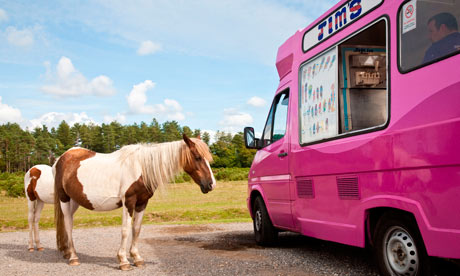
Snuffling, warbling and screeching … These are the things you can expect to hear from the discomfort of your tent in the darkness, and if you're lucky they won't just be coming from your partner.
Night-time is good for listening, partly for scientific reasons: "temperature inversion" causes sound that radiates upwards during the day to be bounced back down to earth, so we can often hear more – and further afield.
What you can listen to all depends on where and when you pitch your tent, of course.
One of the most widespread birds you could hear is the skylark. Singing on the wing, it can be vocal from about 1am – a continuous, almost liquid warble, like a watery computer.
A watery computer? Already we run into the problem of putting these things into words, something John Bevis has tackled in a beautiful little book: Aaaaw to Zzzzzd: The Words of Birds. He writes the skylark as "tirra-lira", or "whither I flee, whither o whither I flee".
Children and dogs will be able to hear the squeak of pipistrelle bats as they hoover up insects in the darkness. More likely, though, among the high-pitched entries will be common and pygmy shrews, which sound like a tiny bicycle that needs oiling – possibly underneath your tent.
Premier wildlife sound recordist Chris Watson, who can often be found camped out with David Attenborough, has had rather more exotic experiences than you're likely to get in the UK. "One of the most amazing sounds I have ever recorded is of a hippopotamus tripping over my guy ropes in east Africa. It was terrifying," says Watson. "But much closer to home, in the UK, I've been camping near Holy Island, and I could hear grey seals singing out on the Snook over a mile away … Amazing." The good thing about being near water, says Watson, is that estuary birds follow the cycle of the tides, not the sun, so you may well hear them at night, especially the bubbling, onomatopoeic curlew.
Away from the water, on heathland and moorland at dusk, nightjars emit a sustained electronic purring. Crickets and field/meadow grasshoppers make sound by rubbing body parts together – a more chirpy, whistling result for crickets than grasshoppers, who have a drier rattle. But you try getting a tune out of rubbing your legs against your wings.
If you're on a woodland edge, you may be near a badger sett. Aside from general scratching and grunting, the young can be heard "wickering" – a kind of rapid growl-squeak that could be the stuff of nightmares if the result of your mushroom foraging is hallucinatory. Other scampering and snuffling could be male hedgehogs chasing females in pursuit of very careful sex.
A common night call is the tawny owl, which reverberates wonderfully in the woods. It's the classic "tu-wit" or "wooohoo" people imitate by blowing through their cupped hands, and the sound effects department's shorthand for: "Oooh, night-time. Spooky." The barn, or "screech" owl lives up to its name on farmland, but you are more likely to hear the low, velvety "hoo" of the long-eared owl.
In the early summer, the nightingale is a possibility (flutey repeated notes, shifting in pitch and speed) but people often confuse this with the robin, normally the first bird to sing.
Much of the time we live behind glass, able to see the world but not hear it. A tent puts a spin on the senses: it blocks your sight but allows you to hear everything. So lie back, close your eyes and enjoy the show …

